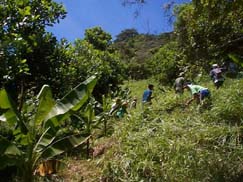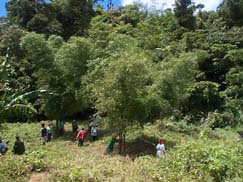After intensive community organizing that lasted for years, TULUNGAN
registered with the Department of Labor and Employment (DOLE) in 1990. Two years later, it
acquired stewardship rights over 19 hectares of forest reservation in Sorsogon by virtue
of a Certificate of Stewardship Agreement Agreement (CFSA) awarded by the Department of
Environment and Natural Resources (DENR). TULUNGAN was the first recipient of such a
contract in the entire Bicol Region.
The association started off with only seven members, thus could
hardly finish work on their initial 19-hectare abaca plantation. Farmers from the
neighboring barangays of Rizal, San Isidro, Panlayaan and Salvacion were recruited to be
able to meet their target. Recruitment was not difficult since the association was fast
gaining a respectable reputation and becoming popular in the area. Today, TULUNGAN has 107
active members whose ages range from as young as 15 and as old as 82.
 Since its formation in 1989, the women members of TULUNGAN has continued to
play key roles in all aspects that concern the organization. The women in the association
have consistently dominated TULUNGAN’S set of officers. In its formative years, the
women members led by its current President, 62-year old Trinidad Olavere, guided the rest
of the group including the male members in their arduous trek to development. In the
process, TULUNGAN has nurtured women power. TULUNGAN, which was at that early stage a
fledgling organization, truly benefited from this nurturing.
Since its formation in 1989, the women members of TULUNGAN has continued to
play key roles in all aspects that concern the organization. The women in the association
have consistently dominated TULUNGAN’S set of officers. In its formative years, the
women members led by its current President, 62-year old Trinidad Olavere, guided the rest
of the group including the male members in their arduous trek to development. In the
process, TULUNGAN has nurtured women power. TULUNGAN, which was at that early stage a
fledgling organization, truly benefited from this nurturing.
These women found new meaning in their lives as they take on the
dual roles of being housewives and community leaders at the same time. They take pride in
individual as well as collective achievements not only in terms of being able to help
their husbands earn a living but also in leading others towards a better life. These women
confidently took on the challenge of dong a man’s job knowing that an upland
farmer’s work is not easy. Climbing uphill for six kilometers just to reach their
plantation carrying with them seedlings and farm implements as well is certainly not an
easy task.
As early as 1993, when funding for their social forestry project
ended, TULUNGAN members have already displayed their rare and remarkable bayanihan spirit
by continuing to work in the 19-hectare abaca plantation they have established. For two
consecutive years, the members worked long and hard under the grueling heat of the sun
without getting income in return. The spirit of voluntarism remains high among members as
evidenced by the almost perfect attendance in the weekly bayanihan or during days when
they had to work without pay.
 To date, one can see how their sacrifices and bayanihan paid off.
They not only planted a 55.5-hectare of abaca plantation, they were also able to establish
an more than 200 hectares of bamboo, timber, fruit, and coconut plantation.
In addition to these plantations, it has
also ventured into other income-generating projects through their Capital Build-Up Fund.
With its investments, CBU, and other assests, TULUNGAN’s net worth is estimated at
about P1.1M with no liability, making it one of the most successful organizations in the
Bicol Region.
To date, one can see how their sacrifices and bayanihan paid off.
They not only planted a 55.5-hectare of abaca plantation, they were also able to establish
an more than 200 hectares of bamboo, timber, fruit, and coconut plantation.
In addition to these plantations, it has
also ventured into other income-generating projects through their Capital Build-Up Fund.
With its investments, CBU, and other assests, TULUNGAN’s net worth is estimated at
about P1.1M with no liability, making it one of the most successful organizations in the
Bicol Region.
With its various projects, member-beneficiaries are able to upgrade
their standard of living. Their average annual per capita income leaped to an impressive
P7,842.00 in 1998 from the 1988 level of P3,389.00. The members’ purchasing power has
significantly increased and the satisfaction of being able to give their children good
education is increasingly felt.

